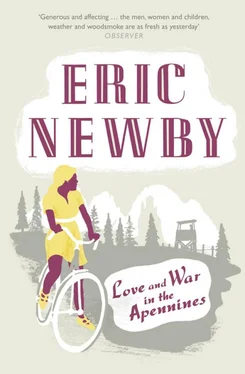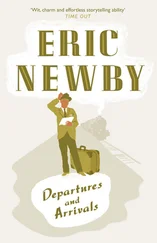At the hospital we were expected. As soon as I got out of the car in the forecourt, two astonishingly powerful women wearing black habits and starched white head-dresses, whom I took to be nuns, came running down the steps towards me, flung my arms round their shoulders, just as the two parachutists had done, and rushed me into the building under a dilapidated iron and glass canopy, like the ones outside old cinemas, with the words Ospedale Peracchi above it, through a pair of mahogany doors, down a dim corridor in which there was a bust of Signor Peracchi, the benefactor, after whom the hospital had been named, and into a hall in which they paused for breath. To me they seemed tough enough to be members of one of those German parachute units whom everyone at the time believed had dropped, dressed as nuns, in the Low Countries, in 1940.
While we stood there a number of very old men and women of a sort who would now, in the ruthless jargon of our time, be called ‘geriatrics’, emerged from the room in which they had been eating their midday meal. In their hands, unheeded, they held crusts of bread, glasses of wine and bowls of pasta. They mumbled excitedly at the sight of this unexpected apparition, and their eyes lit up with pleasure. But it was not for long. They were shepherded back into their dining hall and the two suore picked me up again and whizzed me up a flight of stairs and into a small room on the top floor of the building, as if they were a couple of express messengers delivering a large parcel. And once we were safely in the room they began to unwrap me, just like a parcel. There was no false modesty about these women. In a minute they had stripped off my newly acquired clothes, inserted me into a pair of English pyjamas looted from the orfanotrofio , and put me to bed.
Then the doctor appeared, huge, authoritative and uncommunicative, and put my foot in plaster of paris, and I was given a bowl of the same pasta that the old people below had been eating, while various suore clucked sympathetically, saying poveretto and poverino – words that even I could understand – and then they all went away and after a while I fell asleep in heavenly, clean sheets, like a great cosseted baby.
I woke at four. The venetian blinds were down and the room was in darkness. I got out of bed, hauled on the webbing strap which raised the one over the window which faced the road, and looked out on it. I half expected it to be swarming with Germans; but apart from a small boy who was grubbing about in a ditch, and a girl with black hair done up in a yellow handkerchief who went creaking past on a bicycle, there was no one in sight. The heat was terrific.
By sticking my head out of the window I could see the whole of the front of the hospital, the peeling stucco, the mouldering canopy over the door and the little forecourt, now in shadow, with its iron seats under the trees on which ancient men and women sat placidly or slept and one or two idiots lolled, just as I remembered them on our early morning walks from the orfanotrofio under guard, before the sun had got too hot for them to sit there. Then I had imagined the inside of the building to be a mixture of nineteenth-century workhouse and madhouse, and I had looked at the occupants with feelings of pity and horror; but now that I was inside it and had seen it for myself it seemed a clean and friendly refuge from a crumbling world.
Then the superiora , the head of the hospital appeared, a middle-aged woman with a gentle, resolute face. She wore a more elaborate head-dress than the two suore who had rushed me into the building and a big bunch of shiny keys and an ebony and silver crucifix swung from her black belt. She was carrying a large tray loaded with tea things and bread and butter, ginger biscuits and raspberry jam; everything except the bread and butter looted from the orfanotrofio. She was a more elderly version of the Gaoler’s Daughter in The Wind in the Willows , visiting Toad in his dungeon with a great trayload of tea and buttered toast.
I tried to thank her, partly in French, partly with the few Italian words I knew, but they got mixed up with bits of school Latin, and then I ran out of words completely and looked at her in despair, and she smiled and went out of the room and came back with the girl I had met in the farmyard that morning.
She was wearing a white, open-necked shirt and a blue cotton skirt. She was brown, she was slim, she had good legs, she had ash blonde hair and blue eyes and she had a fine nose. When she smiled she looked saucy, and when she didn’t she looked serious. She was all right.
She began to speak with the rich, faulty, slow English of which I have already tried to give some inkling, and which it would be tedious to continue.
‘You have not forgotten me?’ she said. (I would have had to have been peculiarly gormless to have done so in the five hours which had elapsed since I had last seen her.)
I assured her that I had not done so.
‘Your friends are well. They are now all dressed in clothes the people have given them. Some have already gone away across the Via Emilia. Some are in the farms, most of them are still in the fields. You must stay here until your foot is strong enough to walk on. Yesterday when the Germans came, everyone from the village was in the orfanotrofio. We were stealing the things you left behind. Che robe! What things you left behind you! I was with my father. We had just come out and we met them on the road. They fired, only in the air, but we did not know this. I lay on the road. My father had many packets of cigarettes and he jumped into a ditch to hide, but it was full of water. He held them up like this, above his head, and kept them dry. Then we ran away. My father spoiled his suit, but he is very pleased with his cigarettes.’
‘My mother has made an apfelstrudel for you,’ she went on. ‘In my country we call them struklji. We are not Italian. We are Slovenes. You can eat it after your dinner. Tonight you have chicken. The superiora told me. Be kind to her and do what she says. Now I must go. I have to take food to your friends.’
I asked her when she would come again.
‘I will come tomorrow, if the superiora allows. If you want I will teach you Italian. It will be useful for you, and you can teach me English. I speak badly. My name is Wanda.’ She picked up her basket. At the door she paused.
‘You know,’ she said, ‘You are the only one in this part of the building who is not incinta. You know what is incinta ?’ She puffed out her stomach and banged it with both hands, like a drum. ‘You are in the sala di maternità and tonight a baby will be born.’
When they had gone I laughed out loud. For a year I had slept on a straw mattress with lumps in it, or on bare boards; the company of women had been a dream and I had thought constantly of food, the gnawing hunger of the bored and the unemployed, and I had longed to be alone, to have a room of my own and to be free. Then, suddenly, everything had come at once, freedom, at least of a sort, a wonderful clean bed, delicious food and a beautiful girl to talk to who had a name like a heroine in an Oppenheim novel. Perhaps it was all a dream, or worse, perhaps I had gone mad.
These reveries were interrupted by a huge droning. I got to the window and looked out. Three J.U.52 transport planes were beating over the village like great, dark birds, and as they passed overhead they let fall what seemed to be huge swarms of white butterflies which slowly fluttered earthwards, shimmering in the evening sun.
A few minutes later the ospedale’s male nurse and, apart from the gardener, the only man employed in it, puffed up the stairs to my room bearing one of the leaflets which the gardener had retrieved from the road outside. He was a fat old thing with a red face and a large, bushy moustache. He reminded me of Tenniel’s drawing of the Walrus, but without the tusks. His name, he told me, was Giulio.
Читать дальше












